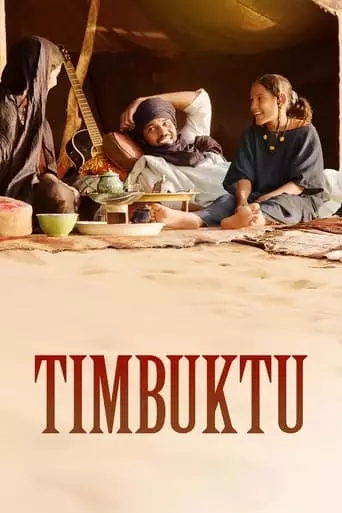
Timbuktu (2014) Watch Online Free
Just outside of the Malian city of Timbuktu, now occupied by militant Islamic rebels who impose the Sharia on civilians and inconvenience their daily life, a cattleman kills a fisherman.
Timbuktu (2014), directed by Abderrahmane Sissako, is a profoundly moving drama that explores the impact of militant extremism on daily life in the Mali city of Timbuktu. Set against the backdrop of the 2012 occupation of northern Mali by jihadist militants, the film presents a poignant narrative that is both intimate and universal, capturing the devastating effects of an oppressive regime on a community’s soul.
The film focuses on Kidane (Ibrahim Ahmed), a peaceful Tuareg herdsman who lives with his wife Satima (Toulou Kiki), daughter Toya (Layla Walet Mohamed), and adopted son Issan (Mehdi A.G. Mohamed) in the desert outskirts of Timbuktu. Their life is disrupted by the arrival of radical Islamic militants who impose harsh Sharia laws. This includes prohibiting music, smoking, and even soccer, while women are forced to wear full-body veils and are subject to violent punishments.
Kidane’s personal tragedy unfolds when his prized cow is killed by a local fisherman’s nets, sparking a violent confrontation. In a moment of frustration, Kidane kills the fisherman, leading to his arrest and a death sentence under the new regime’s rules. His family’s life, once filled with love and serenity, is torn apart as they are caught in the crossfire of ideological extremism and personal vendettas.
“Timbuktu” is a delicate examination of both personal and collective resilience under extreme conditions. While the film depicts the brutality of the jihadist occupation, it does not fall into the trap of one-dimensional portrayals of evil. Instead, it offers a nuanced view of the militants, showing their hypocrisies and insecurities. For example, the character of Abdelkrim, a local jihadist, exemplifies the internal contradictions of the regime—flouting the rules they enforce while attempting to control others’ lives
The film is not just a story about oppression but also a testament to the human spirit’s resistance to such tyranny. The women in Timbuktu, though subjected to severe restrictions, continue to exhibit strength, often defying the militants’ laws in small yet meaningful ways, such as the defiant fishmonger who refuses to wear gloves or the woman whose sorrowful song becomes an act of resistance
Visually, the film is stunning, with cinematographer Sofian El Fani creating a desert landscape that is both beautiful and menacing. The wide shots of the vast, empty desert reflect the isolation and hopelessness of the situation, while the intimate close-ups of the characters emphasize their emotional depth and humanity. A particularly powerful sequence features a soccer game played without a ball, a metaphor for life under an oppressive regime where the joy of living is hollowed out, yet the will to live endures
Watching Timbuktu will likely leave you with a mix of emotions. The film’s somber tone and portrayal of everyday suffering under tyranny can be deeply unsettling, but it also brings moments of hope and resilience that may inspire you. The strength of the human spirit in the face of oppression is a powerful message, and the film’s stark beauty may leave you reflecting on the emotional toll of war and occupation. Ultimately, Timbuktu is a film that will stay with you, provoking thought long after the credits roll
In conclusion, Timbuktu is not only a visually stunning piece of cinema but also an essential narrative that sheds light on the horrors of extremism while celebrating the perseverance of those who fight for dignity and justice.
